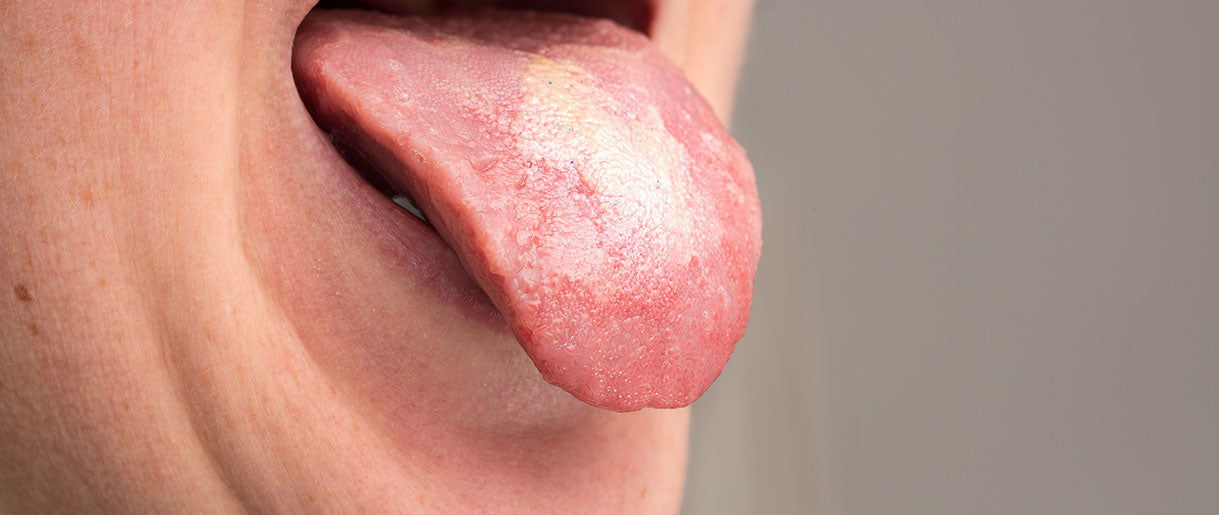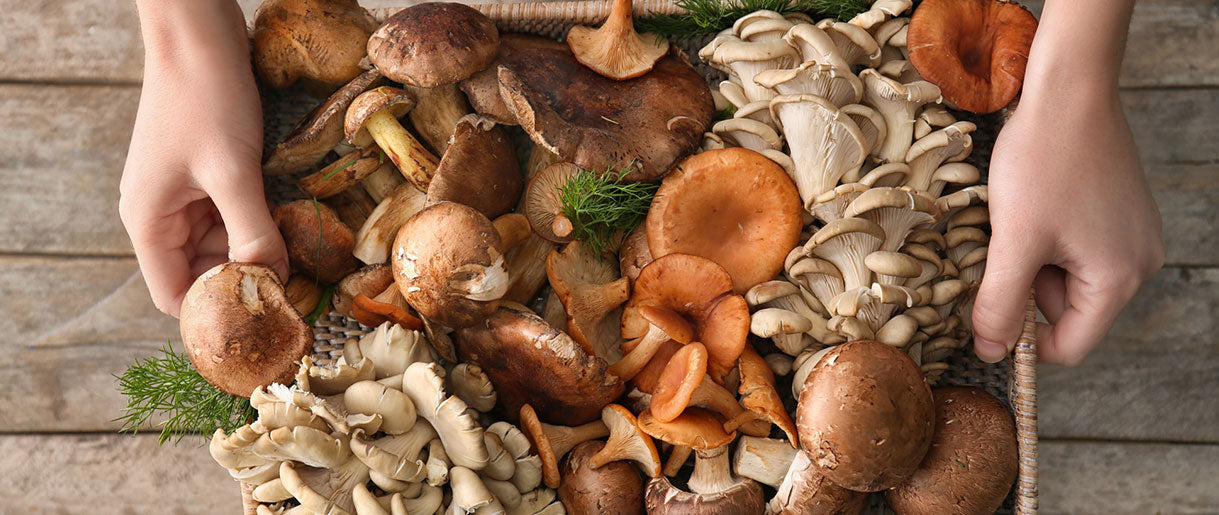Our bodies change as we age, some of which might be difficult to live with. Menopause is a shift that occurs when a woman's ovaries stop releasing eggs, and her body stops producing associated hormones.
While medications are available to help control symptoms, there is no such thing as a "magic cure," an increasing number of women report enduring overpowering adverse effects from menopause therapy, such as weight gain, exhaustion, and psychological distress.
As a result, many women look to nature for guidance, with the wise and fascinating world of medicinal mushrooms becoming an increasingly popular pitstop. Reishi, Cordyceps, Lion's mane, and Maitake, in particular, have shown encouraging effects in alleviating some symptoms. Below, we will explore the symptoms of menopause and the best mushrooms for menopause that may help with the transition.
Understanding Menopause And Its Challenges

Menopause is the period in a woman's life when her menstrual cycles end, and her estrogen levels fall. Menopause is a normal event and transition for women, although the timing, experience, and symptoms differ.
Menopause can occur between the ages of 40 and 50. It is defined as the absence of a period for twelve months.
Menopause is a natural biological process that occurs as part of aging. Psychological, physical, and emotional symptoms, such as hot flushes, can disrupt sleep, sap energy, and impact emotional health and relationships. Numerous effective therapies are available, ranging from lifestyle changes to hormone medication.
Nutritional Benefits Of Mushrooms For Menopause Support
Medicinal mushrooms are adaptogenic, which means they help you adapt to stressful situations and decrease your body's stress load. They are liver tonics, kidney tonics, and lung tonics. Furthermore, they help improve thyroid function by lowering thyroid antibodies, and they help manage blood sugar levels by increasing insulin sensitivity.
Mushrooms also have antibacterial and antiviral properties. So, yes, they minimize all of the factors mentioned that predispose a woman to a more intense menopausal transition, as well as others! Furthermore, several of them act as specialized hormone regulators.
They also contain unique compounds that may aid in the following:
- Strengthen the immune system.
- Reduce inflammation.
- Increase detoxification.
- Promote overall health and well-being.
- Provide cardiovascular support (reduce blood pressure, improve cholesterol levels)
- Improve digestive function (by providing prebiotics, which serves as a food source for beneficial probiotic microorganisms).
Potential Effects Of Mushrooms On Menopause Symptoms

For millennia, functional mushrooms have been utilized for therapeutic purposes. Their possible health benefits range from enhancing gastrointestinal and immunological health to improving sleep, physical performance, memory, and focus, among other things.
Because of the chemical complexity of mushrooms, they have also been examined for their possible menopausal benefits. They are classified as adaptogens or supplements that help you adapt to stressful situations like menopause.
There are several mushroom species, but scientists have focused on a few medicinal mushrooms for menopause that may have therapeutic effects. Reishi, Maitake, Cordyceps, and Lion's Mane are among them.
Reishi

Reishi mushroom regulates hormones. It may help minimize hot flushes by assisting the HPA (hypothalamic-pituitary-ovarian) axis. This action may help regulate estrogen production while enhancing the sensitivity of estrogen receptors, allowing you to use less estrogen.
It may help minimize pelvic inflammation(1) and pain. In addition, according to a study, Reishi may help reduce abnormal growths, particularly those associated with breast and ovarian cancer.
It may aid in the improvement of sleep(2) and energy levels. In addition, many traditional practitioners regard Reishi as a spiritual development and wisdom promoter.
Maitake

Maitake mushroom is known as the mushroom of reproductive growth. Many women going through menopause will be diagnosed with fibroids. A variety of factors cause fibroids.
One such element is estrogen dominance, while insulin-like growth factors are a lesser-known contributor. By modulating insulin sensitivity(3), Maitake aids in the reduction of abnormal growth.
This may also aid in ovulation induction in perimenopausal women with PCOS, as this is another reproductive growth linked to insulin resistance. Postmenopausal women can still benefit from Maitake since it may halt the progression of osteoporosis by stimulating osteoblasts and lowering bone loss.
Cordyceps

Traditional Chinese medicine has long regarded Cordyceps as the fungus of choice for female hormonal changes, effective in resolving reproductive issues but also beneficial in libido loss. Furthermore, because it is invigorating and aphrodisiac, it may be helpful in the case of menopause.
One of the most essential advantages of consuming Cordyceps is increased energy. This could be attributed to increased blood oxygenation. Exhausted women are less likely to want to engage in sexual activities. Cordyceps may help maintain a healthy libido and boost sexual satisfaction by increasing blood flow to the genitals.
Increased blood flow may also improve your athletic performance and strength. This mushroom may also promote a healthy HPA axis, improving hormonal balance. It may also help with sleep.
Lion’s mane

Lion's mane active compounds quickly pass the blood-brain barrier, promoting good cognition and happier moods. This is accomplished by producing nerve growth factors and brain-derived neurotrophic factors. This stimulates the formation of new neural connections, the strengthening of existing ones, and the synthesis of myelin sheaths surrounding your nerve roots.
This translates to a healthier and happier brain that enhances learning and memory while alleviating menopausal mood swings, irritability, anxiety(4), and sadness. Historically, this mushroom was only available to royalty.
Incorporating Mushrooms Into Your Diet

Here are a few tips to include mushrooms into your diet if you want to use them to aid with menopause symptoms:
Mushroom powders or extracts are a convenient way to incorporate mushrooms into your diet. They can be added to smoothies, teas, or incorporated into recipes
Take a supplement that contains a blend of beneficial functional mushrooms. These supplements often contain concentrated extracts of specific mushroom varieties and can provide targeted benefits for menopausal health.
Some medicinal mushrooms are also edible. For example, Shiitake, Lion's mane, Cremini, and Maitake mushrooms can be added to soups, stews, and stir-fries to boost their antioxidant content.
Mushrooms for Menopause
FAQs About Mushrooms For Menopause
Which Mushroom Is Best For Female Hormones?
Cordyceps mushroom has long been regarded as a beneficial fungus for hormone imbalance and for promoting vitality and libido, all of which can be impaired during and after menopause. With its brain-supporting properties, Lion's Mane mushroom can also benefit menopausal women.
Can Mushrooms Alleviate Hot Flashes And Night Sweats?
Menopause symptoms can be alleviated by using functional mushrooms. For example, a combination of Shiitake and Maitake mushrooms has been shown in studies to help reduce hot flashes and night sweats in postmenopausal women.
Can Mushrooms Be Used In Conjunction With Other Menopause Treatments?
Medicinal mushrooms have no known adverse effects for use in menopause. As a result, they can be used alongside conventional medication.
Key Takeaway
Medicinal mushrooms have made their way into the menopause circle, with research indicating that they can alleviate some of the symptoms associated with hormonal fluctuation and decline.
The best mushrooms for menopause are Reishi, Maitake, Cordyceps, and Lion's Mane, which can help restore sleep, reduce anxiety, balance the body, enhance vitality, and regulate hormones. However, as always, please consult with your healthcare provider to ensure it is appropriate for you.
References
- Suppression of inflammatory and allergic responses by pharmacologically potent fungus Ganoderma lucidum, (1)https://pubmed.ncbi.nlm.nih.gov/24948193/
- Ganoderma lucidum Effects on Mood and Health-Related Quality of Life in Women with Fibromyalgia, (2)https://www.ncbi.nlm.nih.gov/pmc/articles/PMC7712001/
- Effects of a water-soluble extract of maitake mushroom on circulating glucose/insulin concentrations in KK mice, (3)https://pubmed.ncbi.nlm.nih.gov/11874441/
- Reduction of depression and anxiety by 4 weeks Hericium erinaceus intake, (4)https://pubmed.ncbi.nlm.nih.gov/20834180/








Let Us Know Your Comments